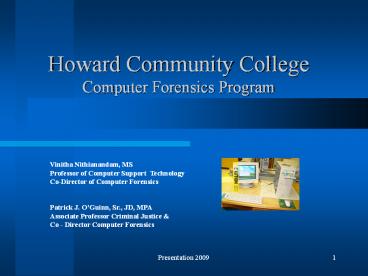Howard Community College Computer Forensics Program - PowerPoint PPT Presentation
Title:
Howard Community College Computer Forensics Program
Description:
... Legal Considerations & Crime Scene Investigation Projects Common References to Computer Forensics Cyber forensics Cyber crime Digital Forensics However, ... – PowerPoint PPT presentation
Number of Views:49
Avg rating:3.0/5.0
Title: Howard Community College Computer Forensics Program
1
Howard Community College Computer Forensics
Program
Vinitha Nithianandam, MS Professor of Computer
Support Technology Co-Director of Computer
Forensics Patrick J. OGuinn, Sr., JD,
MPAAssociate Professor Criminal Justice Co -
Director Computer Forensics
2
Need for Computer Forensics Professional
- Law Enforcement
- Police
- Homeland Security
- Government Contracting Companies
3
HCC Computer Forensics Program History
- Technology department partnered with Criminal
Justice program to develop computer Forensics
courses - 2006 - CFOR Degree Program Started as Criminal
Justice Degree Option - Initially, No University Programs existed in
Maryland for CFOR Degree Transfer - Core Curriculum Consists of Four Intense
Hands-On Lecture/Labs, Case Studies Lab
Analysis, Legal Considerations Crime Scene
Investigation Projects
4
Common References to Computer Forensics
- Cyber forensics
- Cyber crime
- Digital Forensics
- However, all have the common purpose of applying
forensic computer investigation and analysis
techniques to gather evidence suitable for
presentation in a court of law or business matter
5
Forensic Science
- The application of scientific techniques for
investigating, preserving and examining evidence
in a particular field to establish an evidentiary
basis for use in court cases. Source
Merriam-Webster unnamed reference
6
Computer Forensics
- Computer Forensics involves the preservation,
identification, extraction, examination,
documentation, and interpretation of computer
media for evidentiary use in legal proceedings,
administrative hearings, and business
7
HCC Computer Forensics Program Philosophy
- Marriage of Interrelated Disciplines a.
Computer Forensic Procedures b. File
Structures of operating system - C. Operating System Artifacts
- d. Laws of Evidence Procedure
- Hands On Learning by Doing Approach
- A Quick Start to Entry-Level CFOR Careers
8
HCC Computer Forensics Transfer Degree
- 2006 - HCC Established Transfer Articulation
Agreement with Univ. of Baltimore Criminal
Justice Program - 2007- HCC Approved New IT Computer Forensics
Transfer Degree Option - 2007 - Informal Articulation Agreement with
Stevenson University - Computer Technology Programs Partnerships Are
Still Evolving
9
HCC Computer Forensics Core Courses
- CFOR I01 - Computer Forensics 1
- CFOR 200 - Computer Forensics II
- CFOR 210 -Computer Forensics III
- CFOR 250 - Computer Network Forensics Technology
10
(No Transcript)
11
(No Transcript)
12
CFOR I 01 Computer Forensic I
- Basic CFOR Theories Protocol
- Basic computer system
- Disk Geometry
- File system Structures
- Dos Tools (Disk editor, etc) Windows Forensic
Tools - Case Studies, Crime Scene Investigation,
Privacy/Privilege Laws
13
CFOR 200 Computer Forensics II
- Advanced CFOR Theory Practice
- Windows Artifacts (Windows XP)
- Hash and Signature Analysis, Restoring Deleted
Partitions - Case Studies, Report Writing
- Computer Forensics Laws
- Password Recovery
- CD/DVD analysis
- File System -NTFS
14
CFOR 210 Computer Forensics III
- Advanced CFOR Concepts Analysis
- Windows Forensic Tools
- Cross validation
- Cell Phone forensics
- PDA Hand Held Device Analysis Tools
- Examiner Witness Preparation Testimony
- Advanced Report Writing
15
CFOR 250 Network Forensics
- Network Incident Response
- Analyzing network traffic (sniffing)
- Netbios/FileSharing attacks
- Examining hacked system
- IP and e-mail tracing
- Network Protocols
- Case Studies
- Live Forensics analysis
16
HCC Computer Forensics Enrollment
- Approximately 50 students are currently enrolled
in HCC CFOR Courses - Future Enrollment Increases Are Expected to
Continue as Program Expands Diversifies
17
HCC Computer Forensics Student Profiles
- Information Technology Professionalsa. Network
Security, DB Admins, Programmersb. Software
Developers, Help Desk Engineersc. Network
Engineers, Intelligence, Consultantsd. Federal
Agency IT Employees - HCC Criminal Justice Students
- HCC Information Technology Students
- University IT Majors (Maryland, Hopkins, etc)
- Public School Technology Teachers/Trainers
- Registered Nurses
- Law Enforcement Agents/Officers
18
HCC Computer Forensics Student Backgrounds
- Typical CFOR Student Credentialsa. In Progress-
HCC AA Transfer Degree Studentsb. Bachelors
Degree College Grads - c. Masters Degree College Grads
- d. Retired Business Professionals
- e. Holders of Multiple IT Certifications
- f. Certified Public School Teachers
19
HCC Computer Forensics
- Howard County Police CFOR Police Academy Recruit
Training Curriculum - JHU Digital Forensics Challenge
20
HCC Computer Forensics Student Examiners
- Our Students Handle
Incident Scene Evidence Collection
Crime/Incident Scene Diagrams
Computer Forensic Lab Analysis
Expert Witness Testimony
21
HCC Computer Forensics Q A Session
- Your Questions Comments Are Welcome
- Thanks to Dr. Davina Pruitt-Mentle for giving me
an opportunity to present

